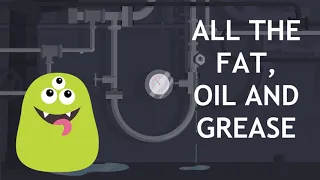Don’t pay the price for feeding a fatberg this Christmas

Pouring turkey fat and other festive leftovers down the plughole could leave households forking out a small fortune this Christmas.
That’s according to the Consumer Council for Water (CCWater) which says about a fifth of us still confess to putting fat, oil and grease from cooking down the sink – increasing the likelihood of a blocked drain or sewer. People aged 18 to 34 are the most likely to drive their sink round the U-bend by using the plughole to tip away their waste.
It can cost more than £200 to get a contractor to clear a drain, but that’s nothing compared to the misery and damage that can be caused by sewer flooding when a pipe gets clogged up with our Christmas leftovers.
The consumer group is urging people to let these fatty substances cool before scraping them straight into the bin to reduce the risk of a blockage sinking their celebrations. Households might also want to consider using an old container like a butter tub or jam jar to collect fat before disposing of it.
Watch how the residents of Blockage Street came unstuck after feeding a greedy fatberg lurking beneath their feet

Steve Grebby, CCWater’s Policy Manager, said:
Many of us love a Christmas roast but our drains and sewers cannot stomach them – that’s why it’s so important not to let fatbergs feed on our leftovers. Fat and grease should be left to cool before being scraped straight into the bin. It might cost you a little more time and effort but it’ll save you the heartache and money of trying to clear your drain or deal with the devastation of seeing your home flooded with sewage.
Water companies spend about £100 million of customers’ cash every year clearing clogged up sewers. More than half of these blockages are caused by fat, oil, grease and other items that have no place in our sewers like wet wipes and sanitary products.
About 6,500 homes and work places end up being flooded with sewage as a result of blockages caused by fat and other unflushables, with thousands more households counting the cost of getting someone to clear their drain.
Feeding fatbergs can also end up polluting beaches and waterways, which is why CCWater is supporting the BinIt4Beaches campaign to raise awareness of how we can all help protect the environment. You can pick up some top tips on how to play a part by following the hashtag #BinIt4Beaches.
For more information or to arrange an interview with CCWater sewer expert Steve Grebby please call the media team on 0121 345 1005.


